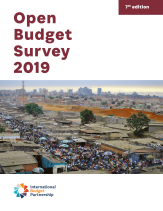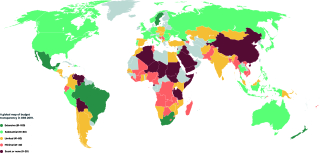
Posted by Vivek Ramkumar and Paolo de Renzio[1]
We began writing the global report for our latest Open Budget Survey (OBS 2019) several months ago, amid a backdrop of mass demonstrations across the world. In France and Iraq, Chile and Lebanon, Haiti and Ecuador, people were mobilizing against the rising cost of living, cuts in public services and increasing taxes. This anger reflected broad concerns with growing inequality, exclusion, and lack of trust in government—all linked to how public resources are managed. We framed the need for open budgets as part of a broader call for economic and political renewal, and for reconnecting governments and their citizens.
But, as we prepared to go to press, COVID-19 broke out. In no time, street protests were replaced by wailing sirens and appeals to help disrupted livelihoods while economic shutdowns became the new norm. Although taken aback, we realized that what was happening around us did not invalidate our key messages. The pandemic demands quick and massive interventions from governments and other actors. And these interventions need to be characterized by honesty, transparency, engagement, and public trust—the very objectives that drive the OBS.
Government budgets are the expression of essential decisions regarding the collection and use of public funds. These decisions affect everyone. Yet for many—especially those with modest means for whom publicly funded services are most critical—budgets remain closed and distant. These restrictions need to change, not only because people are demanding access, but because open budgets can help ensure that governments’ efforts to respond to the pandemic reach those most in need, whether in hospitals, remote areas or informal settlements.
Our latest Open Budget Survey – the world’s only independent and comparative measure of budget transparency and accountability – covers 117 countries encompassing 93 percent of the global population. It reveals that four out of five governments fail to reach the minimum threshold for both adequate budget transparency and oversight as measured against international standards (see map below).
The report finds a modest global improvement in budget transparency since the previous survey (for 2017). This is consistent with the trend over the past decade, which saw the average global score increase by 20 percent. Despite these gains, budget transparency across the world remains insufficient (with an average score of only 45 out of 100). In regions like Sub-Saharan Africa and the Middle East and North Africa many governments only publish minimal amounts of budget information. There are, however, countries that perform well in all regions and at different income-levels. Examples include Indonesia, Ukraine and Guatemala, whose scores have risen above 61, the level deemed sufficient to promote an informed public debate on budget policies.
Click on the map for a better image resolution
Even when governments publish sufficient information on budget policies, few provide formal spaces in which meaningful dialogue between government and citizens can occur. The average global score on the survey’s participation measure is a dismal 14 out of 100. Encouragingly, some governments are introducing interesting innovations in this respect. The Mexican government established a “social comptrollers” system through which programs established to aid disadvantaged communities are directly monitored by committees of beneficiaries. Portugal, South Korea, and Sierra Leone have also taken steps to increase public participation in budget policies and processes.
The survey also measures the strength and independence of legislatures and supreme audit institutions—the key institutions that provide formal budget oversight in most countries. Here the global picture is mixed and exposes key weaknesses in fiscal accountability in most countries. Of the 117 countries surveyed, only 30 have adequate oversight from both legislatures and audit institutions.
These sobering findings raise even more concerns during this time of crisis. As governments rush to adopt massive spending measures to address the impact of the pandemic on health systems and the economy, some may dismiss budget openness as an unnecessary burden. We believe that this is mistaken. Rapid and effective emergency responses should not come at the cost of weakened accountability. Rather, more transparency, public participation and independent scrutiny can help reduce the risk of leakages and corruption, and ensure that the needs of vulnerable groups are adequately taken into account in relief measures.
The IMF is at the frontline of efforts to support governments in responding adequately to the pandemic without compromising accountability, and has called on governments to “do whatever it takes, but keep the receipts”. It would be even better if all those receipts were immediately made available online, thus allowing civil society and the media to closely monitor the implementation of emergency responses.
To ensure that open budget reforms and practices take hold both during and after the COVID-19 crisis, we have launched a Call to Action, inviting governments to:
- Publish information on how public resources are generated, allocated and spent in a timely manner that is accessible to all.
- Create opportunities for all people, particularly those from marginalized communities, to provide input into the budget process.
- Strengthen the monitoring and oversight of budget execution through independent institutions.
- Sustain improvements achieved on open budgeting, thus protecting them from political shifts.
Most countries have the technical skills and the information necessary to respond positively but need to make open budgets a political priority. No time is better than now to promote the accountable use of public resources and to build stronger, more open, and inclusive societies.
This article is part of a series related to the Coronavirus Crisis. All of our articles covering the topic can be found on our PFM Blog Coronavirus Articles page.
[1] Vivek Ramkumar is Senior Director of Policy and Paolo de Renzio Senior Research Fellow at the International Budget Partnership.
Note: The posts on the IMF PFM Blog should not be reported as representing the views of the IMF. The views expressed are those of the authors and do not necessarily represent those of the IMF or IMF policy.






